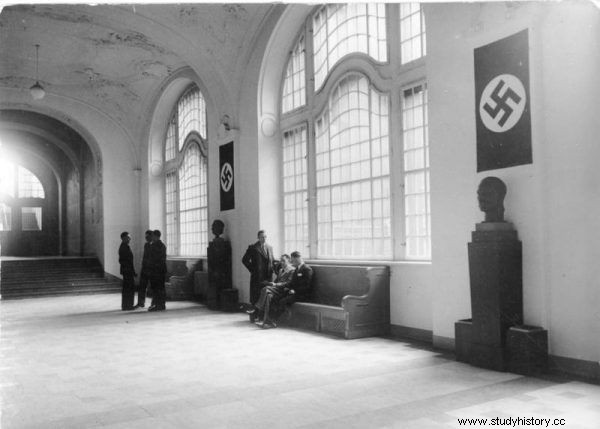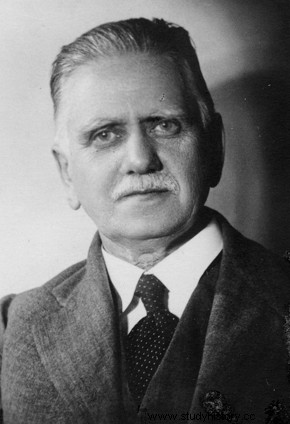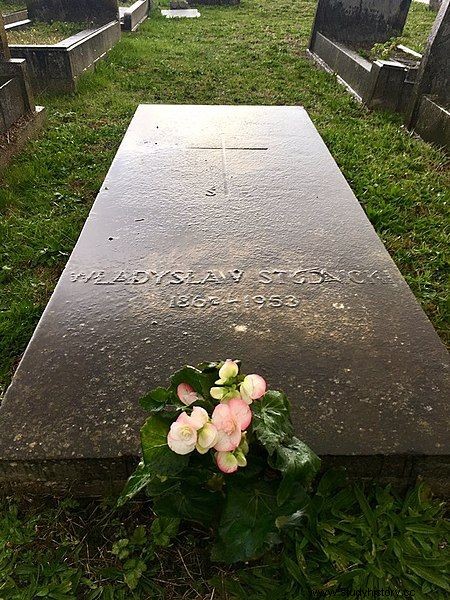This is a real paradox. Władysław Studnicki, Germany's greatest friend in Poland, fell victim to brutal German repression during World War II. We are publishing an excerpt from the new book by Piotr Zychowicz "Germanofil"
It was midnight. There was silence in the gloomy Berlin Gestapo detention center. The iron bar snapped back with a metallic crack that echoed through the empty corridor. A guard appeared on it and, ringing the keys, made his way to the door of one of the cells.
There was a special prisoner in it. Reinhard Heydrich himself ordered that he be placed under special surveillance. The guards had to check every two hours if the man had taken his life. He didn't hang himself in a cell or cut his own veins. An investigation was underway and the Gestapo wanted to get everything he knew out of him.
The guard leaned over and peered through the tempered glass visor - a faint light bulb was on in the cell twenty-four hours a day. In the dim light, the officer saw the detainee. He was not asleep. He was sitting still on the bunk, staring at the shabby wall.
He was an old man, short and weak in build. A tousled gray hair fell on a thin face, lined with time and hard experiences. Even though it was as cold as a kennel in the cell, he wore only a loose shirt. Steam came out of his mouth with every breath.
Tough Pole, thought the ranger. Since his arrival, the entire prison has been buzzing with rumors. It was said that he came to Berlin and demanded an immediate visit with Adolf Hitler. He indignantly spoke of the crimes that the Gestapo and the SS were committing in occupied Poland.
He brought to the capital of the Third Reich the evidence of chilling atrocities against Poles and Jews in the General Government. Mass executions, expulsions, looting and rapes. Documents confirming what was only said in whispers in Berlin.
The elderly man wanted to meet the Führer at the Reich Chancellery to plead for his nation. Demand an immediate cessation of terror, tormenting and tarnishing the dignity of millions of Poles. Returning to Poland the plundered lands in 1939.
A last-minute meeting was prevented by the Gestapo. The bold Pole was arrested in one of Berlin's hotels. The "specialists" from Geheime Staatspolizei subjected him to heavy investigation. Deprived of sleep, tormented, subjected to persistent hours of interrogation - he flatly refused to testify.
Not only that, he was incredibly haughty. He threatened the Gestapo men and made tirades about the crimes committed by the occupiers in his homeland. He warned that if the Germans did not change their behavior - they would lose the war! No Pole has ever dared to speak to the Germans in the capital of the Third Reich.

Interior of the Gestapo headquarters in Berlin (1934)
The guard shook his head. He did not know if this man was infinitely brave or just insane. Anyway, the old man won't take long, he thought. Investigators drove him to the brink of nervous and physical exhaustion. He had a heart attack at the time of questioning. When he was brought into his cell yesterday, he was barely standing.
What's his name? The guard tried to remember the foreign-sounding name. Ah yes. Władysław Studnicki.
Suddenly the prisoner looked directly into the viewfinder. The guard saw two blazing eyes. Torment and despair emerged from them. But they were also the eyes of an iron-willed man, a warrior who never lowered his hands. Ready for fierce battle.
The guard withdrew his head in amazement. He closed the visor and quickly left. Władysław Studnicki was left alone again. Only with your thoughts. Thoughts that kept him awake.
Ghostly visions flashed before his eyes. Glow of fires, a sea of ruins, rows of crosses stretching to the horizon. A river of blood that ran through the scorched earth. Studnicki saw the destruction of his state and nation. A catastrophe that Poland has not experienced in all its tragic history.
Polish germanofil
The hero of the book "Germanophile" is one of the most interesting figures of World War II. And the most hated ones. Unsaid and spat on. Over the years, the worst lies have been written about Władysław Studnicki, and insults have been hurled. He was denied patriotism, ridiculed, tried to portray him as a "madman" and "fascist". The great role he played in history was downplayed.
Why? Because Studnicki had the courage to break out of the "national discipline". He had the courage to have his own separate opinion. Go against the tide. Studnicki opposed not only presidents, prime ministers and influential ministers, but also the public opinion of his own nation. Studnicki was a great individualist.
But he was also a great Polish prophet. On the eve of World War II, he perfectly predicted the catastrophe that befell Poland. A sudden defeat against Germany, a Soviet stab in the back, and even the fact that at the end of the war Great Britain would abandon its "ally" to Joseph Stalin at the end of the war. He predicted everything.
"No anxiety, not reflexes," Studnicki argued in the book "In the face of the coming World War II", written in June 1939 - but the analysis of our position, our raison d'etat and understanding the current political situation can save us from false steps that may take revenge on us , on our children, on a number of later generations. The greatest danger on the part of England is that it wants Soviet Russia to participate in the coalition. But with what can Russia pay for this share? Only Polish lands, only our east, that is, the provinces lying behind the Bug and San. There is no doubt that it will be a secret clause, unknown to Poland. ”

Władysław Studnicki
And further:
"The Western powers, to spare their own blood, will wage a protracted war, to exhaust the enemy's resources. Poland will have to wage a mobile war, and regardless of the success of the war, it may experience German and Soviet occupation in the west. The first would destroy us materially, the second would destroy us nationally and politically. ”
That is why Władysław Studnicki in 1939 tried to persuade the authorities of the Republic of Poland to change the policy leading to the abyss. He believed that Poland should accept the alliance's offer made by Adolf Hitler. Agree to include the Free City of Gdańsk into the Reich and the extraterritorial motorway through Pomerania. And then, alongside the Wehrmacht, attack the Soviet Union.
Studnicki's caution was not heard. Poland, "strong, united and ready", believing in the power of its army and allied guarantees, went to war with Germany . Government propaganda wrote about German cardboard tanks, Marshal Śmigły-Rydz announced that he would not give up "even a button". The public was sure that the Poles, the French and the British would quickly defeat and overthrow the Third Reich.
"Polish opinion, recalled professor Stanisław Swianiewicz, was against these trends of patriotic, swaggering, ready to make the highest sacrifices," recalled - as it often happened in Polish history, one man of small height, but penetrating mind, big heart and inexhaustible courage:Władysław Studnicki. ”
The Polish authorities considered the Polish Germanophile a defeatist. His book "Facing the Coming World War II" was confiscated by the police in a printing press. Prime Minister Felicjan Sławoj-Składkowski put forward a motion that the elderly Polish politician should be locked up in the camp in Bereza Kartuska. Fortunately, this horrendous idea was blocked.
It soon turned out that Studnicki was right. His gloomy predictions came true to the letter. Bloodied, torn apart by its neighbors, abandoned by the West - Poland found itself at the bottom of the abyss.
Polish Pétain?
After the collapse of the state, Władysław Studnicki decided that the nation should be saved. To this end, he made efforts to reach an agreement with the victorious Germany. The creation of a government that - like the government of Marshal Pétain later in France - would allow society to avoid the terror of German occupation and the suffering associated with it.
Studnicki was ready to shoulder this burden and become the head of such a cabinet. Become, as he called it in his memoirs, "Polish Quisling". To this end, he tried to negotiate with the leaders of the Third Reich. These actions were not due to sympathy for Adolf Hitler and National Socialism - which he despised - but from concern for the biological survival of the nation.
Studnicki fought fiercely for his countrymen. He bombarded the Germans with subsequent memorials in which he demanded a change in the criminal occupation policy in Poland. The closure of Auschwitz, Majdanek and Pawiak, and the cessation of shootings and round-ups. He went to the Gestapo building almost every day, where he undertook countless - often effective - interventions for the benefit of arrested Poles.

Gestapo headquarters in Berlin (1933)
Władysław Studnicki paid a high price for his courage. Trapped several times and severely beaten several times by the Gestapo. In February 1940, he was arrested and heavily investigated by the Berlin secret police. Then the Germans interned him near Potsdam for several months. In turn, in July 1941 he was imprisoned in Pawiak for fourteen months. There, another sharp harassment fell on him. The nearly seventy-five-year-old politician almost paid for it with his life.
"When I found myself in the corridor," Studnicki recalled his arrival at Pawiak, "the Gestapo officer supervising our guards hit me with a stick on the head. It turned out that he receives almost every visitor this way. ”
The elderly Studnicki was not only beaten by the Germans, but also imprisoned several times. He was starved and his head shaved. Humiliated. Only then did Studnicki's treatment improve. Other prisoners were impressed by his haughty attitude and numerous confrontations with German guards.
“Studnicki hated Müller, his insolent gaze, his gaudy behavior. On the other hand, Müller could not bear the disregard that Studnicki showed him at every step - recalled Edward Wohlfarth, who was a functionary in Pawiak. - Studnicki was a small man, about Müller's height. Only he was his physical opposite. Müller round, thick. Studnicki is thin and sick.
One day, Müller entered Studnicki's cell during his service and, shouting, ordered him to leave immediately and report to the office. Studnicki got upset and there was a sharp exchange of views. Studnicki, not reacting to the shouting and urging Müller, walked slowly towards the exit.

The grave of Władysław Studnicki
As they approached the grate, Müller, wanting to open it, hit Studnicki, perhaps by accident. The reaction was immediate - Studnicki pushed Müller with such force that he crashed into the grate, bounced off it and fell. As a punishment, Studnicki went to a prison for one night, but from then on Müller stayed away from him. He felt a certain respect. ”
The fate of Władysław Studnicki can serve as an illustration of the madness that took over Germany during World War II. Their best friend in Poland under German occupation was in a German prison. It is hard to find a more eloquent symbol.
"The underground authorities, wrote Stefan Korboński," closely monitoring Studnicki's activities, did not consider it a collaboration, because firstly he acted in good faith and in his understanding in the interest of the country and the population, and secondly, collaboration with the Germans did not take place. On the contrary, his proposals were rejected and he was imprisoned twice. ”
So Studnicki's political action ended in a fiasco. Of course, the Germans did not change their behavior. They were murdering Poles to the end, they committed brutal acts of terror and genocide in occupied Poland. The obstacle was the ideological blindness of the National Socialists, who believed that Polish Untermenschas should be ruled by a knut.
Death in exile
Studnicki - broken by the personal troubles and the defeat of his nation - left Poland for Hungary in the summer of 1944. He had no doubt that if he had fallen into the hands of the Bolsheviks, he would have ended up with a bullet in the back of his skull. From Hungary, through Germany and Italy, the Polish Germanophile made his way to Great Britain. There, he died in poverty and oblivion in 1953.
"Poland has experienced a catastrophe greater than the imagination of the blackest of the greatest pessimists," he wrote shortly before his death. - The country's resilient forces were exhausted because they were senselessly squandered in a few years. Our dire plight is largely the result of a wrong policy. Realizing the error, analyzing the events of the past is today an indispensable task to save the nation from similar errors in the future and to implement it into deeper political thinking. "
Władysław Studnicki fought to the end. In the pages of articles, brochures and books written in exile, he argued that Poland had only two options:it could be part of the Soviet sphere of influence or the future, united Europe. He counted on the collapse of the Soviet Union, integration of Central and Eastern Europe and the conclusion of a close alliance between Germany and Poland. These dreams - as we know - materialized in the years 1991 - 2004. Studnicki, the "leading Polish Germanophile" did not live to see it.
So Studnicki could repeat the protagonist of Juliusz Słowacki's poem:
… This is my armor!
And these are my sorcery thoughts!
Although you resist me today - my future!
And my victory will be beyond the grave!
And I will leave the judgment forever ...
Source:
- The article is an excerpt from the book Germanophile. Władysław Studnicki - a Pole who wanted an alliance with the Third Reich Piotr Zychowicz, which was recently released on the market by Rebis
